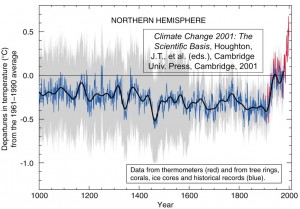As part of the AAAS meeting in Vancouver last week, Dr. Michael Mann gave a talk for the Pacific Institute for Climate Solutions. Not this Michael Mann , but this one.
You could Wiki this, but the short Bio is thus: Dr. Mann is a geophysicist and geologist who worked with a team of scientists who used a variety of proxy climate indicators (tree rings, coral growth patterns, ice cores, stalactite layers, etc.) to measure climate over the last 1000+ years. turns out the graph showed a sharp rise in temperatures in the Northern Hemisphere over the last 100 years. The graph was compelling enough, and the data robust enough, that I was included in the UN’s International Panel on Climate Change Third Assessment report.
Around that time, one of Mann’s co-workers used the expression “hockey stick” to describe the curve on the graph, borrowing the nickname from an older graph of atmospheric Ozone made by other scientists 20 years ago during another global atmospheric debate.
The graph was such a stark image, displaying our current situation in such clear terms, that is simply could not be left unaddressed by those who see Anthropogenic Climate Change as some sort of conspiracy.
Included in those people are several Canadians: Steve McIntyre ( a retired mining engineer) and Ross McKitrick (an economist) tried their hand at Climate Science and wrote a paper in a a fake science journal claiming the graph was the product of flawed science, and the battle for “Mann’s Hockey Stick” was on.
From the beginning of his talk, it is clear Dr. Mann is exactly what you would expect: a science geek, and a reluctant public figure. His speech was not polished or slick, the images not particularly compelling to a non-science audience, but it was an entertaining talk about how one guy doing proxy climate measurements can somehow become an enemy to some, just because he collected a little data on a topic that would become a political football.
In the last 10 years, this PhD Geologist who spends most of his time counting tree rings and teaching Earth Systems Science at Penn State, has had his e-mails stolen and publicized, Has been summoned to congressional hearings, investigated by his State Attorney General, been subject to academic kangaroo courts at his university, and accused of everything from perpetuating the “greatest hoax in the history of science” to outright fraud. Numerous investigations later, no-one has found any evidence of fraud or scientific misconduct.
But that doesn’t even matter, because one thing none of the people criticizing the “hockey stick” have done is collect any data that refutes it. They have instead spent so much energy and time trying to cast doubt on the veracity of the “hockey stick” that they have failed to acknowledge that there is an entire hockey league of sticks that are the same shape: measured atmospheric anthropogenic CO2, sea level change, ice extent, ocean temperatures, the list goes on.
In the end, Michael Mann is still a reluctant public figure (partly evidenced by his reluctance to take legal action against the people slandering him: he would rather just do science and find solutions). All he can do is keep reporting what he and other people doing the actual science have found. The scientific case is relatively straightforward; the greenhouse effect has been known for two centuries; we know human CO2 numbers are going up, and we know it is anthropogenic; we know earth has warmed more than 1 degree C over the last 100 years,and the trend is up. if you choose to ignore the thermometers, there are literally dozens of other lines of evidence: surface temps, permafrost loss, ocean stratification, and numerous observed biophysical reactions consistent with rapid warming. combine this with a distinct paucity of evidence against the trend, and it is remarkable anyone is still debating this.
The final point was one I have heard a lot recently: this is no longer a scientific debate, it is an ethical one. We need to make the ethical decision of whether we will burden the next generation and the one after with the unforeseen consequences of what we are doing today in the interest of Business as usual”. However, that’s s not a scientific question, it is a philosophical one. Once science has provided the data, what you do with it is not up to the Scientists.
Mann was quick to point out that the issue is not, as some suggest, the “politicization of science” (inherently, science is immune from politics, as its self-regulating mechanism will win out in the end), but the “science-ization” of politics, where a political position or immediate pragmatic need of a political group is mistaken for a scientific fact.
To beat this, we may need more reluctant scientists like Mann to take a more active part in the popular media, and provide the factual information we need to make rational decisions, informed by our ethics.
It’s the best hope we have to get past this strange, anti-science phase we are in right now in North American society.
Which is kind of what I think Neal Stephenson is getting into here:


I think Stephenson might be mixing up science and engineering…
Good point, Andrew.